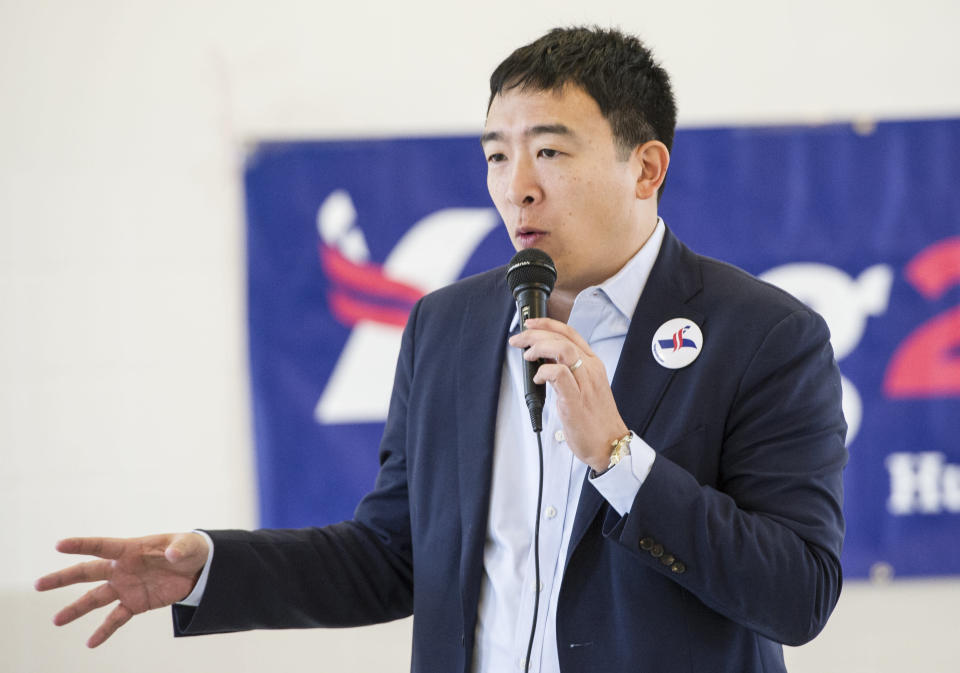Why a 2020 presidential candidate is advocating for NCAA athletes to get paid

Andrew Yang believes so strongly that college athletes should get paid that he’s made it a policy position of his presidential campaign.
Lumped in with policies like “legalize marijuana,” “free marriage counseling for all” and “life-skills education in all high schools” on Yang’s campaign website is a link to a page titled “NCAA should pay athletes.”
On that page, Yang lays out the idea that athletes who help generate revenue for their schools — like football and men’s basketball players — should be given the opportunity to get some of the revenue their schools receive from sponsorships, television deals and conference payouts.
“If you’re benefitting directly economically from the work and talent of these young people, then the young people need to be getting some of that money,” Yang told Yahoo Sports. “And it wouldn’t make sense to me that the schools get to keep all of the money they’re making off of the work that these athletes are doing without paying the athletes themselves.”
On the policy page, Yang advocates for a “performer athlete” class in college sports. Universities with performer athletes — the athletes who are revenue drivers for an athletic department — “would be required to start an affiliated taxable for-profit entity through which both corporate sponsorships and performer athlete salaries would flow.”
The proposal would be a sweeping overhaul of the NCAA’s amateurism model and significantly change the way that college athletic departments operate. It’s an overhaul that would be staunchly resisted by the NCAA and member schools. Any chances of immediate success are lesser than a snowball in hell.
The same may be said about Yang’s likelihood of becoming president in January of 2021 too. Unless you’ve been paying close attention to the Democratic Party’s primary process ahead of the 2020 presidential election, you likely hadn’t heard of the entrepreneur until you read his name above.
But the underdog candidate has generated a passionate following on social media platforms after he expounded on those myriad policy positions — like a basic income of $1,000 a month for all American adults — on Joe Rogan’s popular podcast. And he just crossed the 65,000 donor threshold earlier in the week, meaning he’ll be on the Democratic primary debate stage if he gets above one percent in a few polls.
If Yang gets to the debate, the topic of compensating college athletes isn’t likely to come up. Though the fact that a potential presidential debate participant has simply staked out a policy position against the NCAA’s current construct is another sign of the evolving attitudes towards paying college athletes.
That evolution is showing signs of being bipartisan, too. It’s also making incremental progress in the United States court system.
Just last week, Rep. Mark Walker (R-NC) said he was going to propose a bill that would allow athletes to profit off their names and likenesses via endorsements and other forms of outside income.
And on Friday, a California judge ruled partially in favor of a group of former athletes in an antitrust suit against the NCAA, though Judge Claudia Wilken said that athletes could only get additional compensation from schools in the form of goods “related to the pursuit of academic studies.”
While Walker’s bill wouldn’t impact athletic department budgets, the NCAA said in a statement Thursday afternoon that it felt his efforts were “unnecessary” because there aren’t that many players who would make money from it.
“This bill is unnecessary and may benefit only a small number of student-athletes and cause unintended consequences and negatively impact opportunities for all other college athletes,” the statement said. “This is critical to keep in mind because the NCAA offers a unique model that creates opportunities for academic and athletic achievement to nearly 500,000 student-athletes across 24 sports each year.”
“The NCAA is a 501(c)(3) tax-exempt organization that supports other exempt organizations by providing almost a billion dollars annually to the higher education community through payments and programming. As such, NCAA member-made rules are essential to preserving college sports in the United States, which are separate and distinct from professional sports.”
The NCAA has long used its tax-exempt status and the concept of amateurism as a way to defend its rules prohibiting college athletes from getting paid a salary beyond a cost of attendance stipend or profiting off their likeness. Athletic departments, many of which don’t generate enough annual revenue to match their expenses, would have to overhaul their budgets to pay players a salary.
Yang said he’s open to ideas like what Walker is proposing, but wants to go even further than paying players and strip conferences and athletic departments of their tax-exempt status because they’ve essentially become businesses.
Given the NCAA’s opposition to Walker’s bill, you can imagine what it thinks of Yang’s vastly more far-reaching ideas.
“One of the themes of my campaign is that we have to get beyond capitalism and socialism dichotomy and framework and just use our judgement and look at it and say OK, if these kids are risking their health and making money for these colleges and institutions — and in many cases, the colleges are making enough money to pay their coaches millions of dollars a year — then is that the sort of message that we think is right for young people to receive? That it’s OK for institutions to get rich while the young people are just told to be grateful?”
“One of the reasons I’m passionate about this issue is that it prizes an old way of doing things over what should be an evolution that recognizes the reality that’s been in place for years.”
– – – – – – –
Nick Bromberg is a writer for Yahoo Sports.
More from Yahoo Sports:

